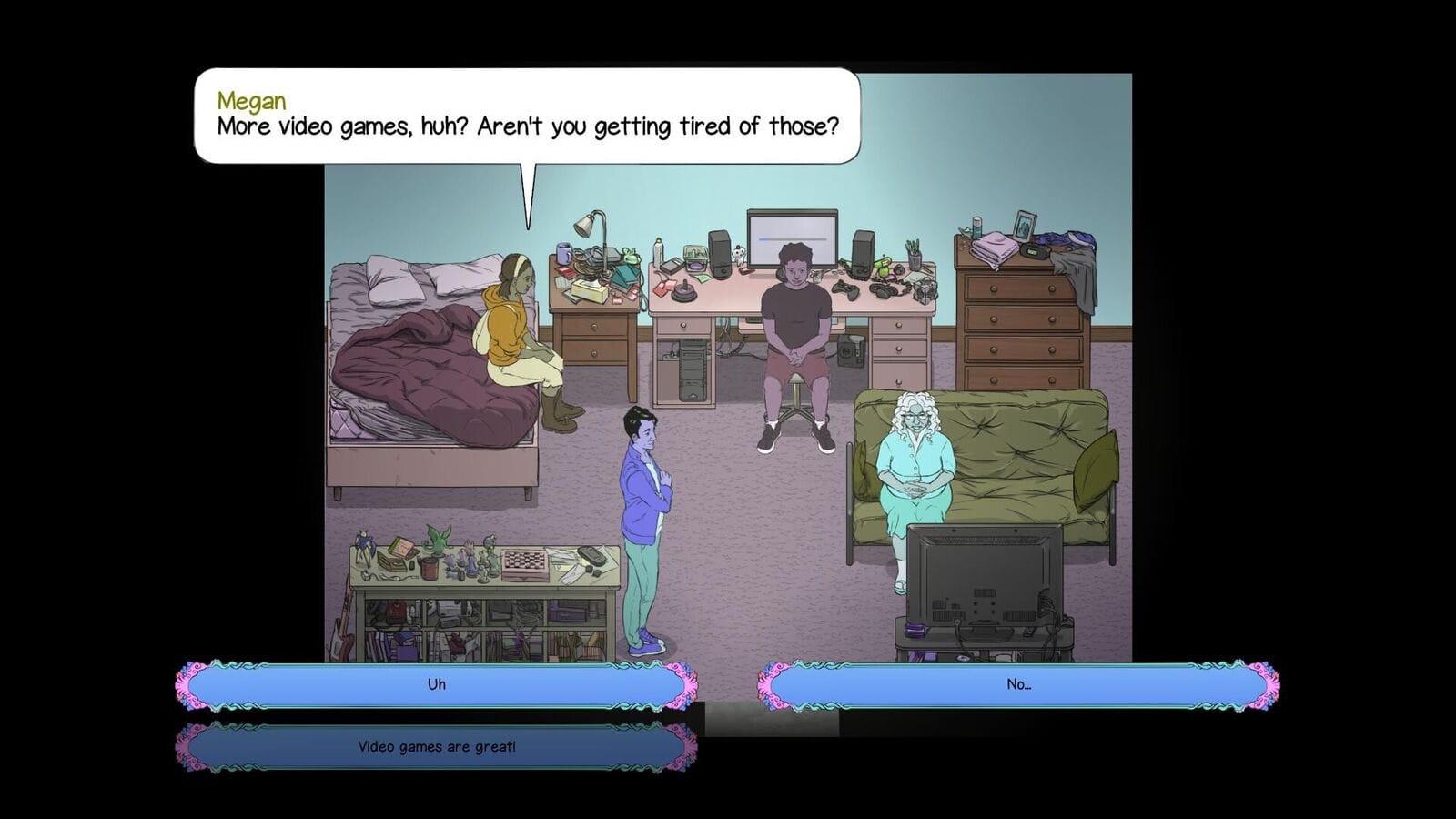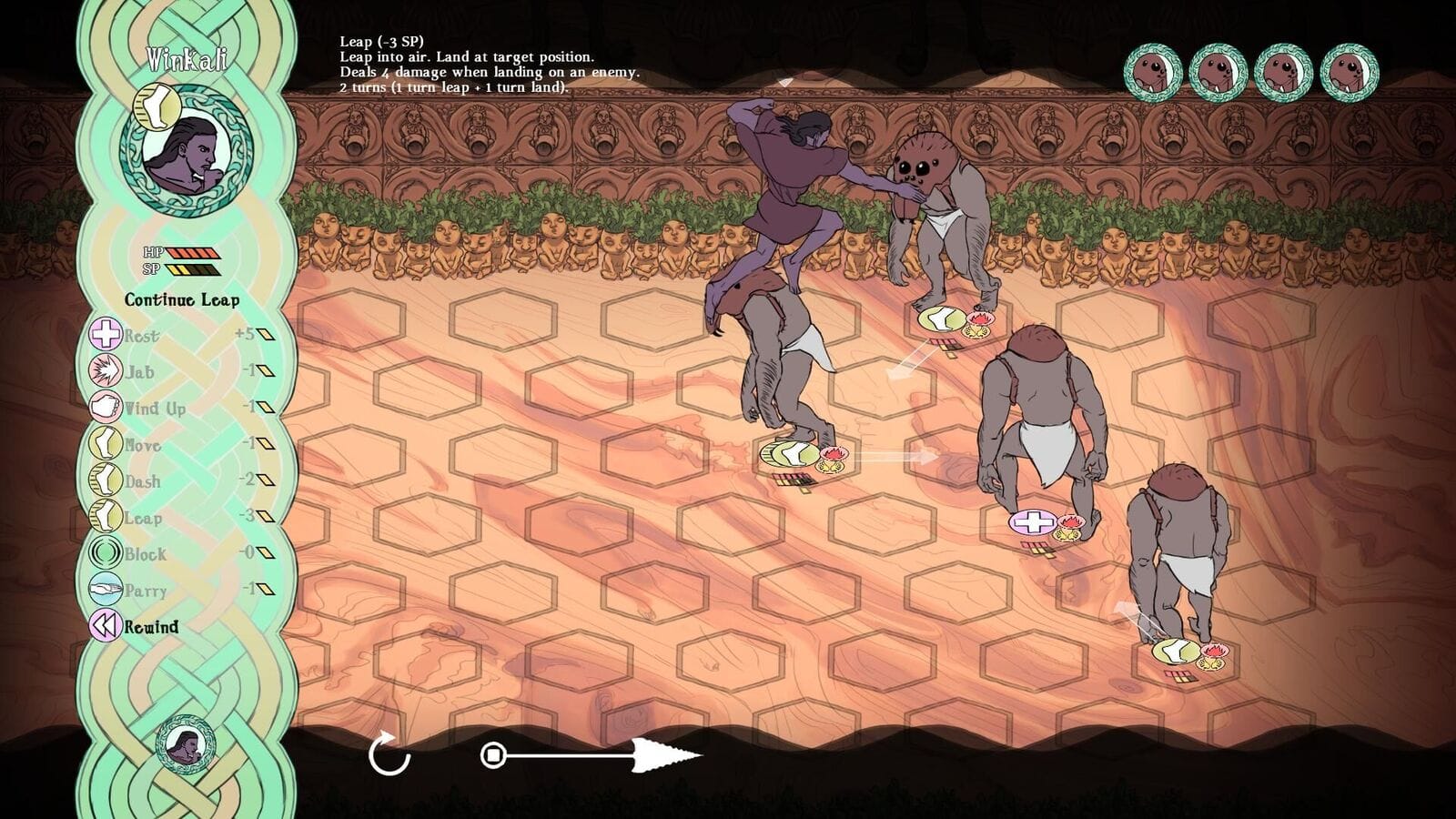Embracing the Weirdness
Legendary Gary is delightful in its weirdness. The indie adventure game takes a casual approach to strategic combat and offers an experience that is half grab-bag-of-unrelated-styles and half touching mise en abyme.

A Story of Two Worlds
Legendary Gary features dual storylines. In one, the titular Gary lives an unremarkable and largely stagnant life in the home he shares with his mother, a woman who has recently become convinced that the Rapture is nearly at hand.
The other story takes place inside Gary’s new computer game, Legend of the Spear. The player takes on the role of Winkali, a man who must rise to the challenge to save his kingdom from villains after his King disappears.
Within Gary’s world, gameplay is a matter of making dialogue choices, walking from one place to the next, and watering the plants. In Legend of the Spear, however, combat is a frequent occurrence and defines the pace of gameplay.
Both worlds incorporate a shared “motivation” mechanic. Motivation is gained from things like earning someone’s respect, winning a battle, or being panicked about a pile of unpaid bills. Just the same, it can be lost through negative experiences like not sleeping enough, being dishonest, or getting dumped.
The mechanic functions as a sort of unstable currency within the game, used to buy dialogue options that would naturally require more motivation to muster like standing up to a friend or boss. It’s is a smart way of gauging how well Gary is doing and helps the player empathize with Gary’s struggle through a pretty accurate representation of something we all struggle with at some point.

Combat
Legendary Gary’s (or, rather, Legend of the Spear’s) combat system is a mostly engrossing affair despite never providing much challenge. Battles take place on a hexagonal grid and feature turn-based exchanges of fisticuffs and magic spells, with a variety of interesting special abilities to spice things up.
Where the game differs from other turn-based systems is in the way turns play out. All combatants, friend and foe alike, move and act simultaneously. This clever approach to grid combat would suggest that combat requires some element of strategy, but the system is forgiving to the point of undermining itself altogether.
The game lets you preview how each “round” will play out as you select your party’s moves. If you don’t like what you see, you can always cancel your party’s actions and try again. In fact, you can rewind the entire battle if it isn’t going your way. At first, this is a novel and welcome function, but over time, it becomes apparent that the ability to preview and rewind any action eliminates any practical challenge.
Not every game needs to be challenging, of course. Certainly, Legendary Gary never implies that it wants to challenge the player’s abilities, but the battle mechanics are intrinsically self-defeating. At times, especially toward the end, it felt like I was just going through the motions (a feeling which runs counter to the direction of the narrative).

Music and Art
Legendary Gary has some of the best and weirdest licensed music I’ve ever heard in a game. All the music, done by xXsickXx, has a sort of late ’80s synth pop vibe. It rarely matches the tone of the story, but there was never a time that I wished the music wasn’t playing. I frequently stopped fighting just to listen. In a way, xXsickXx’s music can be said to remind the player not to take the experience too seriously.
The songs are fun and bright, yet play almost exclusively during combat sections in the fantasy world. There is a jarring dissonance between these things that ultimately—inexplicably—ends up complimenting the experience.
The art, hand-drawn by developer Evan Rogers (What Remains of Edith Finch, The Last of Us), is equally weird and charming. Think ’90s MTV animation like Daria and Beavis and Butthead, with a dash of Aqua Teen Hunger Force and A Scanner Darkly.

Final Thoughts
There is a part of me that wishes there was more to the story. Gary’s relationships with his friends and family play an important role in his life, and I would’ve liked to see those expanded upon. His mother, for instance, has forgone much of her responsibility in favor of embracing the end of the world. This provides much of the impetus for Gary to take stock of himself, to take responsibility, but the moments where the story acknowledges this turn of events come and go so quickly that it’s difficult to really understand the significance until the game is already over.
That’s part of the charm with Legendary Gary, though. It doesn’t need anything more than what it presents. Not really. It’s fine with its weirdness.
The game isn’t going to appeal to everyone. Players who hold steadfast to traditional genre expectations might be quickly turned off by the experience. At its core, though, Legendary Gary is fast, quirky, and honest, full of many unique styles (including that amazing soundtrack) that work together to create a thoughtful and entertaining experience. I definitely recommend giving it a go.
Score: 8.0/10
Legendary Gary released on February 20, 2018, and is available on Steam.
Geron is a freelance journalist currently holed up in the middle of Alaska. He is in love with gaming both for its potential as a medium in the modern world and its simpler role as an endlessly entertaining past time. When he isn't gaming or writing about games, he can usually be found singing loudly to his children or complaining about the cold.
Twitter: @lowsodiumgamer











